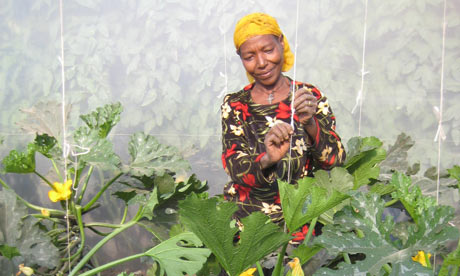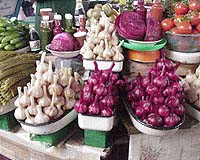– Rockefeller Foundation: Scenarios for the Future of Technologyand International Development (PDF)
* * *
Please support I. U.
PayPal: Donate in USD
PayPal: Donate in EUR
PayPal: Donate in GBP
The man who trades freedom for security does not deserve nor will he ever receive either. – Benjamin Franklin
– Rockefeller Foundation: Scenarios for the Future of Technologyand International Development (PDF)
* * *
Please support I. U.
PayPal: Donate in USD
PayPal: Donate in EUR
PayPal: Donate in GBP
– GMOs Set to Crush Export Markets for Farmers across Ghana:
Ghanaians have been fighting attempts at the imposition of genetically modified organisms (GMOs), by the Biotech industry and The Gates Foundation [1], into their food system for the last few years, including by taking the Government to Court on the issue.[2]
Sustainable Pulse Exclusive
By Ali-Masmadi Jehu-Appiah, Chairperson, Food Sovereignty Ghana
The public GMO debate has mainly focused on health and the environment, but hardly ever on the socio-economic impacts of GMOs. The socio-economic ramifications of the imposition of GMOs alone ought to be enough to ban its use in Ghana. The creeping intrusions of GMOs into Ghana’s economy, is likely to increase poverty, rather than diminish it; by increasing the penetration of transnational corporations into Ghana’s agriculture thus decreasing profit margins for small local farmers. Ghanaian agriculture cannot afford an economy that is designed for the benefit of external interests at the expense of Ghanaians.
Read moreGMOs Set to Crush Export Markets for Farmers across Ghana
– Ghanaian Government Sued over “Illegal” GM Crops Policy (Sustainable Pulse, Feb 10, 2015):
Food Sovereignty Ghana (FSG) has filed a writ of summons against the Ghanaian National Biosafety Committee (NBC) and the Ghanaian Ministry of Food and Agriculture MoFA, with an application for an interim injunction to stop any release or commercialization of genetically modified cowpeas and rice, until the provisions of Ghana’s Biosafety Act are expressly and fully obeyed.
FSG are not only calling for an injunction on the commercialization of GM rice and Bt cowpeas, but on all GM crops until the National Biosafety Authority is in place.
Read moreGhanaian Government Sued over ‘Illegal’ GM Crops Policy
Related info:
– Ebola Hoax CONFIRMED: Full CNN video Reveals Crisis Acting + Fakery (Video)
– Ebola Hoax: 100% REVEALED! CNN + NYT Caught Using CRISIS ACTORS! (MUST-SEE Video)
Thomas made me aware of the following through the Jimstonefreelance mail box:
I have confirmed the following is real, and was written by a man living in Accra Ghana.
Other than the original facebook post, this web site is the first one to carry this and it needs to be spread, the future may be riding on this one, ARCHIVE, POST POST AND RE-POST!
Nana Kwame wrote:
– Ebo-LIE (Nana Kwame via Facebook, Oct 8, 2014):
People in the Western World need to know what’s happening here in West Africa. THEY ARE LYING!!! “Ebola” as a virus does NOT Exist and is NOT “Spread”. The Red Cross has brought a disease to 4 specific countries for 4 specific reasons and it is only contracted by those who receive treatments and injections from the Red Cross. That is why Liberians and Nigerians have begun kicking the Red Cross out of their countries and reporting in the news the truth. Now bear with me:REASONS:Most people jump to “depopulation” which is no doubt always on the mind of the West when it comes to Africa. But I assure you Africa can NEVER be depopulated by killing 160 people a day when thousands are born per day. So the real reasons are much more tangible.
Reason 1: This vaccine implemented sickness being “called” Ebola was introduced into West Africa for the end goal of getting troops on the ground in Nigeria, Liberia, and Sierra Leone. If you remember America was just trying to get into Nigeria for “Boko Haram” #BULLSHIT but that fell apart when Nigerians started telling the truth. There ARE NO GIRLS MISSING. Global support fell through the floor, and a new reason was needed to get troops into Nigeria and steal the new oil reserves they have discovered.
H/t reader squodgy.
– 20 Signs That The Global Economic Crisis Is Starting To Catch Fire (Economic Collapse, Feb 14, 2014):
If you have been waiting for the “global economic crisis” to begin, just open up your eyes and look around. I know that most Americans tend to ignore what happens in the rest of the world because they consider it to be “irrelevant” to their daily lives, but the truth is that the massive economic problems that are currently sweeping across Europe, Asia and South America are going to be affecting all of us here in the U.S. very soon. Sadly, most of the big news organizations in this country seem to be more concerned about the fate of Justin Bieber’s wax statue in Times Square than about the horrible financial nightmare that is gripping emerging markets all over the planet. After a brief period of relative calm, we are beginning to see signs of global financial instability that are unlike anything that we have witnessed since the financial crisis of 2008. As you will see below, the problems are not just isolated to a few countries. This is truly a global phenomenon.
Over the past few years, the Federal Reserve and other global central banks have inflated an unprecedented financial bubble with their reckless money printing. Much of this “hot money” poured into emerging markets all over the world. But now that the Federal Reserve has begun “tapering” quantitative easing, investors are taking this as a sign that the party is ending. Money is being pulled out of emerging markets all over the globe at a staggering pace and this is creating a tremendous amount of financial instability. In addition, the economic problems that have been steadily growing over the past few years in established economies throughout Europe and Asia just continue to escalate.
The following are 20 signs that the global economic crisis is starting to catch fire:
Read more20 Signs That The Global Economic Crisis Is Starting To Catch Fire
– After Creating Dollar Exclusion Zones In Asia And South America, China Set To Corner Africa Next (ZeroHedge, July 15, 2012):
By now it really, really should be obvious. While the insolvent “developed world” is furiously fighting over who gets to pay the bill for 30 years of unsustainable debt accumulation and how to pretend that the modern ‘crony capitalist for some and communist for others‘ system isn’t one flap of a butterfly’s wings away from full on collapse mode, China is slowly taking over the world’s real assets. As a reminder: here is a smattering of our headlines on the topic from the last year: ““World’s Second (China) And Third Largest (Japan) Economies To Bypass Dollar, Engage In Direct Currency Trade“, “China, Russia Drop Dollar In Bilateral Trade“, “China And Iran To Bypass Dollar, Plan Oil Barter System“, “India and Japan sign new $15bn currency swap agreement“, “Iran, Russia Replace Dollar With Rial, Ruble in Trade, Fars Says“, “India Joins Asian Dollar Exclusion Zone, Will Transact With Iran In Rupees“, ‘The USD Trap Is Closing: Dollar Exclusion Zone Crosses The Pacific As Brazil Signs China Currency Swap“, and finally, “Chile Is Latest Country To Launch Renminbi Swaps And Settlement“, we now get the inevitable: “Central bank pledges financial push in Africa.” To summarize: first Asia, next Latin America, and now Africa.
Yep: the Yuan may not be the reserve currency by default, but at this rate China will have bilateral, read USD-bypassing relations, with all countries in Asia, South America and shortly Africa (where none other than Goldman Sachs has been pushing harder than anyone). Once the entire world is trading in CNY, it will be merely a matter of flipping the switch and all those fancy three-letter economic theories that explain why the uber-welfare state works just becayse the US can print an infinity+1 in debt, will all suddenly find themselves completely and totally bidless.
From China Daily:
China is to promote the yuan’s use in settling trade and investment with Africa, and encourage the more active development of Chinese financial institutions across the continent, a senior central bank official said on Friday.
Li Dongrong, assistant governor of the People’s Bank of China, said Africa has the capability of becoming a new hub of international capital flow, and the yuan’s use there should be further improved in accordance with rising demand for the currency there.
“We will continue to encourage domestic financial institutions to increase their presence and business across the continent,” Li told delegates at the Forum on China-Africa Financial Cooperation in Beijing, adding that the cooperation potential between the two sides is huge, as Africa’s economy continues to take off.
Highly recommended article.

A woman tends vegetables at a giant Saudi-financed farm in Ethiopia.
We turned off the main road to Awassa, talked our way past security guards and drove a mile across empty land before we found what will soon be Ethiopia’s largest greenhouse. Nestling below an escarpment of the Rift Valley, the development is far from finished, but the plastic and steel structure already stretches over 20 hectares – the size of 20 football pitches.
The farm manager shows us millions of tomatoes, peppers and other vegetables being grown in 500m rows in computer controlled conditions. Spanish engineers are building the steel structure, Dutch technology minimises water use from two bore-holes and 1,000 women pick and pack 50 tonnes of food a day. Within 24 hours, it has been driven 200 miles to Addis Ababa and flown 1,000 miles to the shops and restaurants of Dubai, Jeddah and elsewhere in the Middle East.
Ethiopia is one of the hungriest countries in the world with more than 13 million people needing food aid, but paradoxically the government is offering at least 3m hectares of its most fertile land to rich countries and some of the world’s most wealthy individuals to export food for their own populations.
The 1,000 hectares of land which contain the Awassa greenhouses are leased for 99 years to a Saudi billionaire businessman, Ethiopian-born Sheikh Mohammed al-Amoudi, one of the 50 richest men in the world. His Saudi Star company plans to spend up to $2bn acquiring and developing 500,000 hectares of land in Ethiopia in the next few years. So far, it has bought four farms and is already growing wheat, rice, vegetables and flowers for the Saudi market. It expects eventually to employ more than 10,000 people.
But Ethiopia is only one of 20 or more African countries where land is being bought or leased for intensive agriculture on an immense scale in what may be the greatest change of ownership since the colonial era.
An Observer investigation estimates that up to 50m hectares of land – an area more than double the size of the UK – has been acquired in the last few years or is in the process of being negotiated by governments and wealthy investors working with state subsidies. The data used was collected by Grain, the International Institute for Environment and Development, the International Land Coalition, ActionAid and other non-governmental groups.
The land rush, which is still accelerating, has been triggered by the worldwide food shortages which followed the sharp oil price rises in 2008, growing water shortages and the European Union’s insistence that 10% of all transport fuel must come from plant-based biofuels by 2015.
Read moreThe 21st-century African land grab by rich countries facing global food and water shortages
This article is a must read.
Related video:
Nutricide – Criminalizing Natural Health, Vitamins, and Herbs (Dr. Rima Laibow, M.D.)
__________________________________________________________________________
By: Dr. Gregory Damato, Ph.D.

(NaturalNews) Codeath (sorry, I meant Codex) Alimentarius, latin for Food Code, is a very misunderstood organization that most people (including nearly all U.S. congressmen) have never heard of, never mind understand the true reality of this extremely powerful trade organization. From the official Codex website (www.codexalimentarius.net) the altruistic purpose of this commission is in “protecting health of the consumers and ensuring fair trade practices in the food trade, and promoting coordination of all food standards work undertaken by international governmental and non-governmental organizations”. Codex is a joint venture regulated by the Food and Agricultural Organization (FAO) and World Health Organization (WHO).
Read moreCodex Alimentarius: Population Control Under the Guise of Consumer Protection

Wastewater is most commonly used to produce vegetables and cereals (especially rice), according to this and other IWMI reports, raising concerns about health risks for consumers, particularly of vegetables that are consumed uncooked.
As developing countries confront the first global food crisis since the 1970s as well as unprecedented water scarcity, a new 53-city survey conducted by the International Water Management Institute (IWMI) indicates that most of those studied (80 percent) are using untreated or partially treated wastewater for agriculture.
In over 70 percent of the cities studied, more than half of urban agricultural land is irrigated with wastewater that is either raw or diluted in streams.
Read moreMetropolitan Wastewater Ends Up In Urban Agriculture